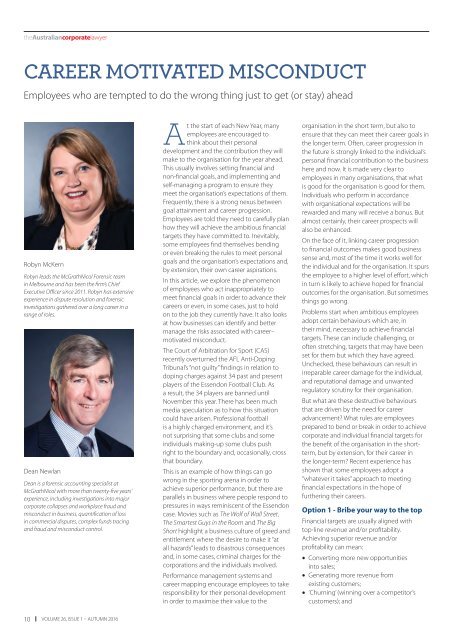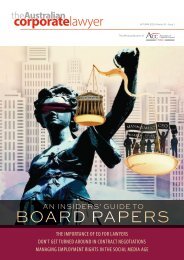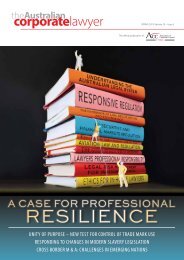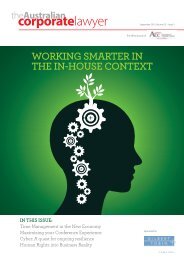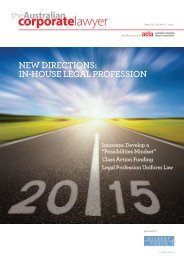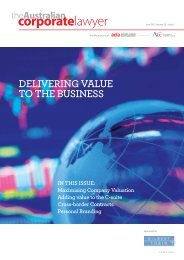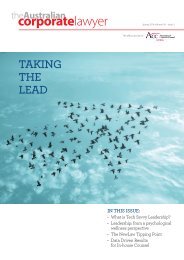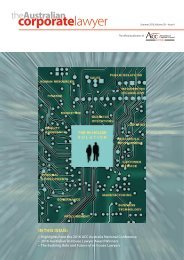Australian Corporate Lawyer - Autumn 2016
Australian Corporate Lawyer is the official publication of the Association of Corporate Counsel (ACC) Australia. The Autumn 2016 issue focuses on 'Advancing your in-House Career' and features a range of articles covering topics including: managing stress; trade marks and domain names; career motivated misconduct and cultural diversity.
Australian Corporate Lawyer is the official publication of the Association of Corporate Counsel (ACC) Australia. The Autumn 2016 issue focuses on 'Advancing your in-House Career' and features a range of articles covering topics including: managing stress; trade marks and domain names; career motivated misconduct and cultural diversity.
Create successful ePaper yourself
Turn your PDF publications into a flip-book with our unique Google optimized e-Paper software.
the<strong>Australian</strong>corporatelawyer<br />
CAREER MOTIVATED MISCONDUCT<br />
Employees who are tempted to do the wrong thing just to get (or stay) ahead<br />
Robyn McKern<br />
Robyn leads the McGrathNicol Forensic team<br />
in Melbourne and has been the firm’s Chief<br />
Executive Officer since 2011. Robyn has extensive<br />
experience in dispute resolution and forensic<br />
investigations gathered over a long career in a<br />
range of roles.<br />
Dean Newlan<br />
Dean is a forensic accounting specialist at<br />
McGrathNicol with more than twenty-five years’<br />
experience, including investigations into major<br />
corporate collapses and workplace fraud and<br />
misconduct in business, quantification of loss<br />
in commercial disputes, complex funds tracing<br />
and fraud and misconduct control.<br />
At the start of each New Year, many<br />
employees are encouraged to<br />
think about their personal<br />
development and the contribution they will<br />
make to the organisation for the year ahead.<br />
This usually involves setting financial and<br />
non-financial goals, and implementing and<br />
self-managing a program to ensure they<br />
meet the organisation’s expectations of them.<br />
Frequently, there is a strong nexus between<br />
goal attainment and career progression.<br />
Employees are told they need to carefully plan<br />
how they will achieve the ambitious financial<br />
targets they have committed to. Inevitably,<br />
some employees find themselves bending<br />
or even breaking the rules to meet personal<br />
goals and the organisation’s expectations and,<br />
by extension, their own career aspirations.<br />
In this article, we explore the phenomenon<br />
of employees who act inappropriately to<br />
meet financial goals in order to advance their<br />
careers or even, in some cases, just to hold<br />
on to the job they currently have. It also looks<br />
at how businesses can identify and better<br />
manage the risks associated with career–<br />
motivated misconduct.<br />
The Court of Arbitration for Sport (CAS)<br />
recently overturned the AFL Anti-Doping<br />
Tribunal’s “not guilty” findings in relation to<br />
doping charges against 34 past and present<br />
players of the Essendon Football Club. As<br />
a result, the 34 players are banned until<br />
November this year. There has been much<br />
media speculation as to how this situation<br />
could have arisen. Professional football<br />
is a highly charged environment, and it’s<br />
not surprising that some clubs and some<br />
individuals making-up some clubs push<br />
right to the boundary and, occasionally, cross<br />
that boundary.<br />
This is an example of how things can go<br />
wrong in the sporting arena in order to<br />
achieve superior performance, but there are<br />
parallels in business where people respond to<br />
pressures in ways reminiscent of the Essendon<br />
case. Movies such as The Wolf of Wall Street,<br />
The Smartest Guys in the Room and The Big<br />
Short highlight a business culture of greed and<br />
entitlement where the desire to make it “at<br />
all hazards” leads to disastrous consequences<br />
and, in some cases, criminal charges for the<br />
corporations and the individuals involved.<br />
Performance management systems and<br />
career mapping encourage employees to take<br />
responsibility for their personal development<br />
in order to maximise their value to the<br />
organisation in the short term, but also to<br />
ensure that they can meet their career goals in<br />
the longer term. Often, career progression in<br />
the future is strongly linked to the individual’s<br />
personal financial contribution to the business<br />
here and now. It is made very clear to<br />
employees in many organisations, that what<br />
is good for the organisation is good for them.<br />
Individuals who perform in accordance<br />
with organisational expectations will be<br />
rewarded and many will receive a bonus. But<br />
almost certainly, their career prospects will<br />
also be enhanced.<br />
On the face of it, linking career progression<br />
to financial outcomes makes good business<br />
sense and, most of the time it works well for<br />
the individual and for the organisation. It spurs<br />
the employee to a higher level of effort, which<br />
in turn is likely to achieve hoped for financial<br />
outcomes for the organisation. But sometimes<br />
things go wrong.<br />
Problems start when ambitious employees<br />
adopt certain behaviours which are, in<br />
their mind, necessary to achieve financial<br />
targets. These can include challenging, or<br />
often stretching, targets that may have been<br />
set for them but which they have agreed.<br />
Unchecked, these behaviours can result in<br />
irreparable career damage for the individual,<br />
and reputational damage and unwanted<br />
regulatory scrutiny for their organisation.<br />
But what are these destructive behaviours<br />
that are driven by the need for career<br />
advancement? What rules are employees<br />
prepared to bend or break in order to achieve<br />
corporate and individual financial targets for<br />
the benefit of the organisation in the shortterm,<br />
but by extension, for their career in<br />
the longer-term? Recent experience has<br />
shown that some employees adopt a<br />
“whatever it takes” approach to meeting<br />
financial expectations in the hope of<br />
furthering their careers.<br />
Option 1 - Bribe your way to the top<br />
Financial targets are usually aligned with<br />
top-line revenue and/or profitability.<br />
Achieving superior revenue and/or<br />
profitability can mean:<br />
• Converting more new opportunities<br />
into sales;<br />
• Generating more revenue from<br />
existing customers;<br />
• ‘Churning’ (winning over a competitor’s<br />
customers); and<br />
10 VOLUME 26, ISSUE 1 – AUTUMN <strong>2016</strong>


